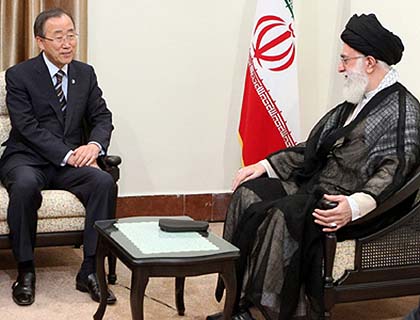TEHRAN - Iran was under diplomatic pressure on Friday after a UN watchdog report said it had expanded its nuclear program and was hampering inspections, and the leaders of the UN and Egypt criticised its key ally Syria.
UN Secretary General Ban Ki-moon, in Tehran for a summit, also called on Iran to release "opposition leaders, human rights defenders, journalists and social activists."
Iranian officials responded to the International Atomic Energy Agency report by denying allegations it was cleaning up a suspect military base and saying the document's release was timed to steal the spotlight from the Non-Aligned Movement gathering.
Supreme leader Ayatollah Ali Khamenei opened the two-day NAM summit with a speech on Thursday railing against the United States, Israel and the UN Security Council, which are at the forefront of the pressure directed at his country.
He said Iran would "never" cease its nuclear energy activities, regardless of UN and Western sanctions, and insisted that the program was not aimed at developing nuclear weapons, whose use he called an "unforgivable sin."
The International Atomic Energy Agency report released late on Thursday -- in the middle of the Tehran summit -- said Iran had doubled its capacity to enrich uranium at its underground Fordo nuclear facility by installing, but not yet switching on, more than 1,000 more centrifuges.
It also said that UN inspectors wanting to see part of a military base in Parchin, outside Tehran, which is suspected of hosting tests of explosives that could be used in a nuclear warhead, had been "significantly hampered" by months of scrubbing and refused access.
Foreign Minister Ali Akbar Salehi rejected the Parchin allegations, telling the ISNA news agency they had "no technical basis" and that "one cannot clean a site" of nuclear work.
A member of the Iranian parliament's national security and foreign policy committee, Hossein Naqavi Hosseini, said the timing of the report was "politically motivated" with the aim of "undermining the summit."
Iranian officials have previously emphasized that Parchin is an off-limits military base and that the IAEA's focus on it is overblown and based on "false" Western intelligence.
Ban, in a speech at a Iranian diplomats' college, expanded on criticism of Iran's nuclear stand that he had delivered in meetings with Khamenei and President Mahmoud Ahmadinejad, and at the opening of the summit.
He urged Iran to comply with the IAEA and with UN resolutions on the issue, stressing the "cost of Iran's current trajectory" and saying that "any country at odds with the international community... finds itself isolated from the thrust of common progress."
At the summit, he warned that the international "war of words" over the nuclear showdown risked degenerating into "a war of violence," implicitly referring to Israeli and US threats to possibly bomb Iran's nuclear facilities.
On Friday, Ban turned on Iran's ally Syria, saying that while all sides should stop fighting, the Damascus government "had the primary responsibility... to halt its use of heavy weapons."
He said as well that "all those actors who may be providing arms to both sides... must stop."
Egyptian President Mohamed Morsi, who handed over the NAM chair to Iran on Wednesday in the first visit by an Egyptian head of state since Iran's 1979 Islamic revolution, also embarrassed Tehran by publicly siding with the Syrian opposition.
The Syrian insurgency, he said, was a struggle for democracy against an "oppressive" regime, in the same vein as the Arab Spring revolts that brought him to power in June.
The remarks prompted the Syrian government delegation at the summit to walk out during Morsi's speech.
Iran's state media made little to no mention of the contentious comments by Ban and Morsi, focusing instead on the supreme leader's speech and hailing the NAM summit as an important diplomatic event proving Iran was at the center of a nexus of like-minded countries.(AFP)

